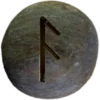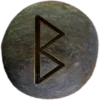Last Updated on October 15, 2024
Table of Contents

Bragi is the Æsir god of poetry, eloquence, and song. His name is linked to the Norse word for poetry, “bragr,” reflecting his role as a divine inspiration for skalds. As a son of Odin and Gunnlöð, Bragi embodies the wisdom of words and artistic expression. His wife is the goddess Idunn, keeper of the apples of immortality, linking Bragi’s influence to the preservation of life and memory through poetry.
Bragi’s defining characteristic is his gift of eloquence. He serves as the mouthpiece for the gods during significant moments, speaking with wisdom and grace. His long, flowing beard symbolizes his deep connection to words and the wisdom of old age. Bragi welcomes fallen warriors to Valhalla, greeting them with poetic praise as they join the ranks of the honored dead. This act emphasizes his connection to both words and the heroic deeds that inspire them.
Elder Futhark Rune and Symbolism
The Elder Futhark rune often associated with Bragi is Ansuz. This rune represents communication, divine inspiration, and wisdom. Ansuz, connected to Odin as well, embodies the power of speech, which Bragi expertly wields. Those who work with the Ansuz rune may seek Bragi’s blessing to improve their own eloquence, creativity, or to gain clarity in communication. Ansuz resonates with the poetic tradition, making it vital for those wishing to tap into the power of divine speech.
Ansuz reminds practitioners of the sacredness of words, especially when invoked through poetic or ritual acts. The rune holds an ancient connection to the verbal crafting of reality, an ability Bragi represents fully.
Bragi’s Importance in Asatru
In Asatru, Bragi’s presence highlights the importance of storytelling, oral tradition, and creative expression. Asatruar believe that through words, they can honor the gods, preserve their heritage, and pass down wisdom to future generations. Bragi’s influence inspires the faithful to embrace skaldic traditions, encouraging the creation of songs and sagas that capture the essence of their beliefs.
Modern practitioners often call upon Bragi during blóts when they seek to give voice to their prayers or when they perform poetic offerings. His role as a god who bridges the divine and the human through language empowers followers to find the beauty in their own speech.

